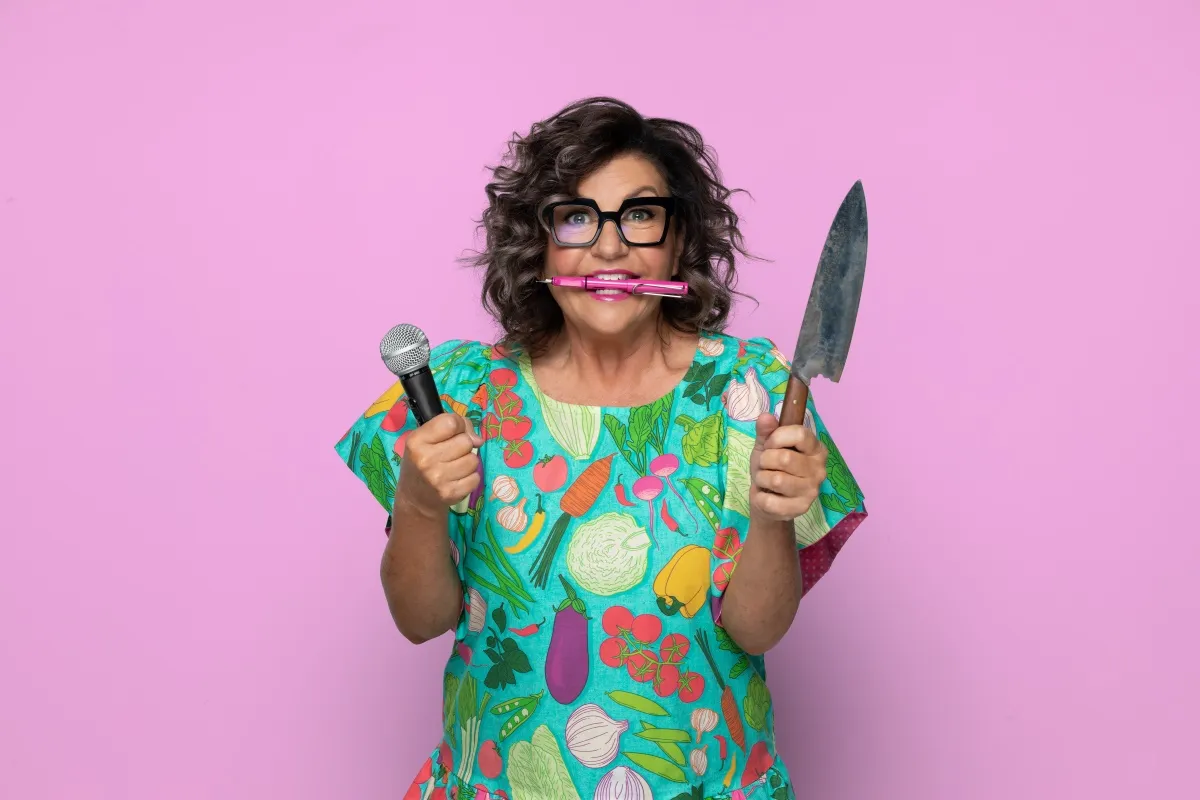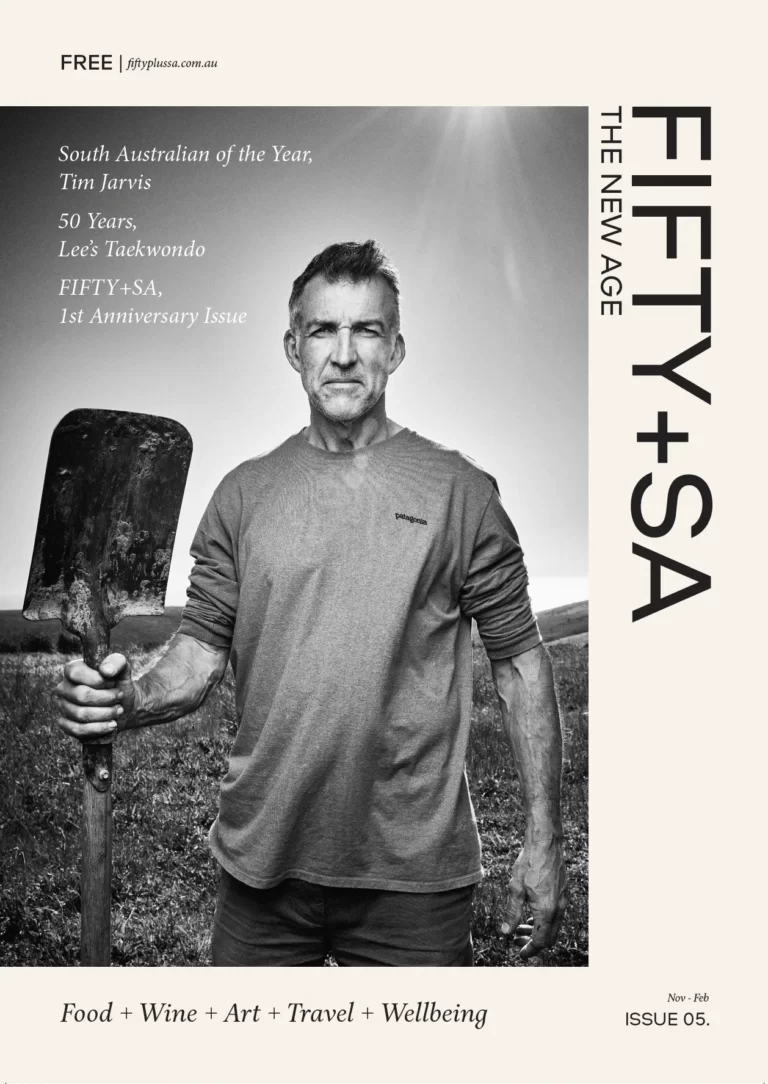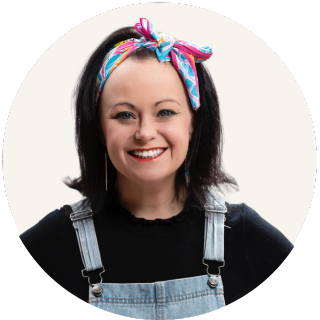
WORDS: Katie Spain
Katie Spain is an award-winning journalist, wine writer and author based on a farm in the Adelaide Hills. When she’s not chasing stories, she can usually be found exploring SA in a vintage caravan called Charlie, or hunting for treasure in op-shops.
As life and career goes, FIFTY+SA’s food editor Mandy Hall juggles a lot of utensils. By day, she battles the ongoing issue of food wastage in her role as campaign director for End Waste AU. Every other waking moment, she champions the South Australians who ethically grow, tend, and make the food on our plate. Mandy knows her grass-fed bovine from her grain-fed beef, but what makes her tick? Food and wine writer Katie Spain breaks bread with her to find out.
Mandy Hall has a dream. One day, she wants to live on a property near the ocean where she’ll regularly submerge her curly locks beneath salty sea water. It’s not the hot summer dips she craves most. During winter, she’ll set up a fire pit on which soup will be cooked in a large pot. “You come and help yourself to a cup of soup then sit around my fire and I’ll hear the stories of your life,” she says. “That is my definition of success. It’s not big, it’s not expensive, it’s not a fancy restaurant; I simply get to nourish and feed people.”
The dream provides insight into how this genuine, humble, curious soul works. When Mandy isn’t fighting food waste battles and spreading produce-packed messages, she judges food awards and is an ambassador for Foodbank SA and Catherine House.
“I think you have to be really very careful about how you define success,” she says. “I do not wish to live an ordinary life and that has nothing whatsoever to do with money. If it all went tomorrow, I’d find a way to survive quite happily. I get more joy from food than I get from anything else.”
Mandy isn’t one for gifts. She does, however, appreciate a card full of heartfelt words, especially when penned by her two children, aged 30 and 18.
“In my Mother’s Day cards they both write about what it’s like to see someone chase their dream” Mandy says. “Not for financial success, rather to chase a dream because it means the world to you and because it leaves you in awe.”
Mandy often talks about awe. It drives her. She experiences awe when working as a food identity and consultant; is engulfed with it when hosting Tasting Australia events; and is hit with awe during interactions with chefs such as Topiary co-owner and executive chef Kane Pollard, The Salopian Inn’s Karena Armstrong, and David Swain and Sharon “Shazza” Romeo from CBD restaurant Fino Vino. “I get an opportunity to have really deep and relevant conversations about food chains, devotion, hard work and what it’s meant for some of these chefs and these restaurateurs to stay open,” Mandy says. “It’s a deep, deep privilege.”
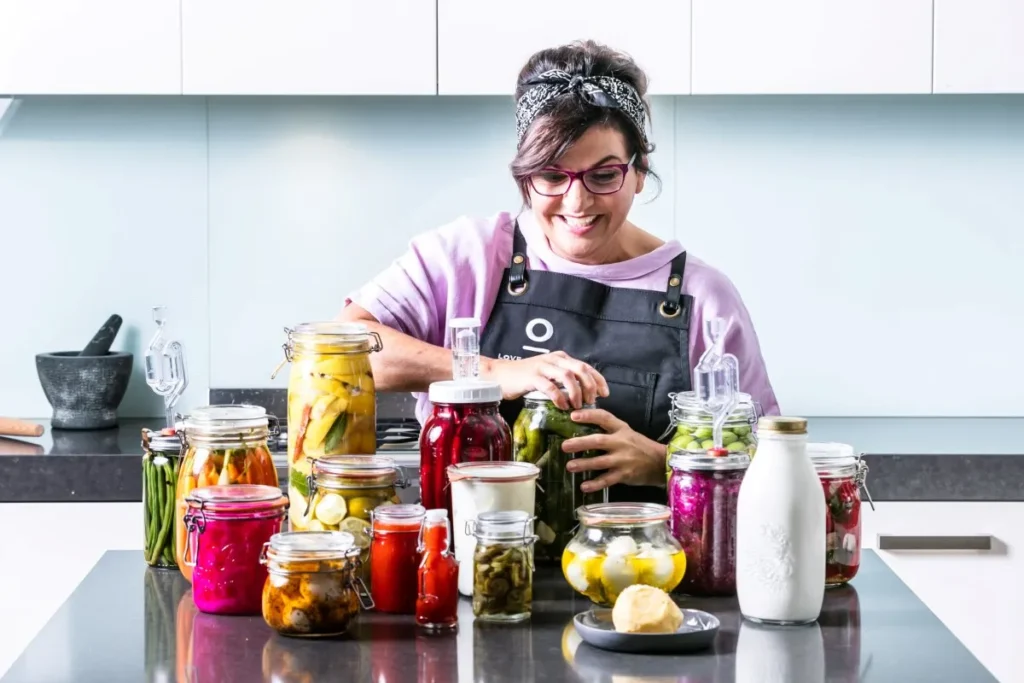
Mandy is also rocked by awe when staying at Daylesford Longhouse, a farm and cooking school owned by friends in Victoria. There she helps tend the animals and embraces the more confronting realities of farming such as humanely raising an animal, then dispatching it and understanding what it takes to butcher it properly. “If I’m going to be talking about food, I need to truly understand it,” she says.
When Mandy walks into a restaurant, it’s common for the maitre’d and floor staff to embrace her. Her warm presence and appreciation invites it. As a child growing up in Norwood, she was bright and vivacious. She grew up in Norwood in Adelaide’s eastern suburbs. “It was incredibly diverse and eclectic. Norwood was the landing spot for all of the immigrants that came from Greece, Italy and all over the world,” she says. “For some reason, they all ended up in Norwood and that was a joy for me.”
Mandy’s father was a talented singer and her mother was a cook at gastro pubs including The British Hotel, The Kent Town Hotel and pubs in Port Adelaide. “I was a free-range kid, the youngest of five,” Mandy says. “I basically did whatever I wanted, because I think they’d almost forgotten they had a kid by then.”
Both grandmothers and a foster brother also shared the family’s living space.
“My grandma on my father’s side was also a great singer. She was very theatrical, quite full on and ‘extra’. Mum’s mother was a very demure English woman who barely said ‘boo’. She had dementia but would do absolutely anything for you. She was also a great baker.”
Eating out was a rare occurrence. “We didn’t have the money. Once a fortnight we’d go to The Parade to get fish and chips wrapped in newspaper. That was a massive deal for us.”
Mandy’s culinary horizons expanded during her early 20s, after an eventful John Farnham concert. To cut a long story short, she was standing in line for the gig at Thebarton Theatre when a member of the band spotted her and invited her backstage. A relationship blossomed and before long, Mandy was being flown around Australia to attend his concerts. The jet setting life came with many-a fancy dining experience.
“I was this 21-year-old girl from Adelaide who hadn’t travelled before and literally had zero idea about anything,” she says. “We’d go to restaurants and I never knew what to order so I just had to eat whatever they did. It meant I ate some really weird and wonderful things.”
Drinking champagne at Sydney’s The Sebel, and devouring steak tartare at the Tolarno Hotel in St Kilda, Melbourne were highlights. “It was the most incredible thing I’ve eaten.”
The Tolarno Hotel was also where Mandy fell in love with the work of French-born Australian artist Mirka Mora who established the venue with her husband Georges Mora after fleeing Poland during World War Two. Murals depicting Mirka’s hand painted angels graced the restaurant walls. Mandy’s relationship with the muso didn’t last, but her appreciation for Mirka did. “I became obsessed with understanding who she was, the life she lived and how it revolved around art and food.”
When Mandy was 22 her father developed a brain tumour and she moved back to Adelaide where she worked in the media, including Austereo, and in sales and marketing for newspapers. She was also the busy mother of a five-year-old.
A Lupus diagnosis changed Mandy’s life. “I was incredibly sick but until then we thought it was stress. There was no tolerance for being ill when you worked in the media so I was made redundant.” She pauses. “I thought my whole world was finishing.”
In a bid to combat the inflammatory disease, doctors prescribed a drug called Methotrexate. “It’s like a form of chemotherapy. I don’t ever ‘poo-poo’ Western medicine because it’s so important, I could see the treatment was literally killing me.”
So began a deep dive into food, specifically the role it plays in health. “I didn’t work during that time. I was super sick and knew I had to heal myself.”
She spent her time at the local farmers market, chewing the ears off growers. “I wanted to understand food production legislations; where a chicken was grown and what the soil beneath was like.” It was a five-year journey. “My partner and I thought I had lost my mind but I was in the happiest place I’ve ever been. The more I forced myself to understand food systems, the more engrossed I became. You can’t find anything more joyous or flavoursome than a tomato picked in the prime of its life or a peach from the backyard when it’s had the sun hit it and it comes from nurtured soil.”
Mandy also became a self-confessed fermentation nut.
“This was 25 years ago, years before we all started talking about sourdough and what free range really means. My son was being sent to school with sourdough spelt bread and all sorts of embarrassing things that no one else was making at home.”
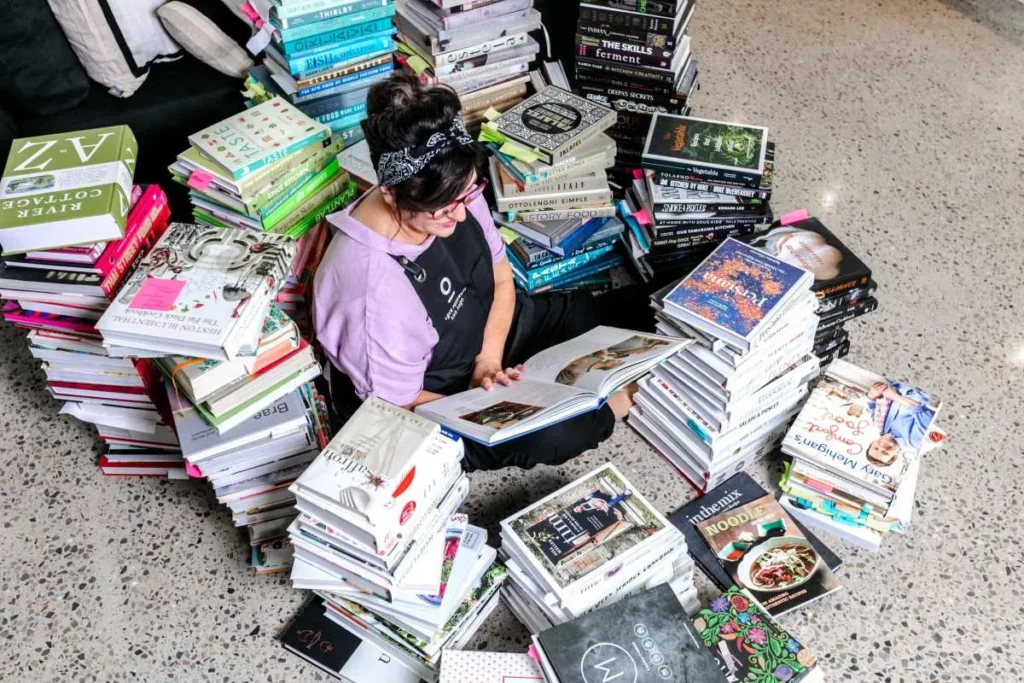
In 2018, Mandy travelled to Tennessee in the United States where she participated in a two-week residency with fermentation expert Sandor Katz.
A year after her return, she applied as a contestant for reality television show MasterChef Australia 2019. She didn’t go all the way (attempting to cook Africola chef and owner Duncan Welgemoed’s wonderful peri peri chicken ended in tears).
“I was never going to win MasterChef,” she admits. “I was a fermenter who had a deep passion for healthy soils and reducing food waste.”
As distressing as elimination on national television was, nothing compares to Mandy’s current battle; the fight against food waste.
“I work for an organisation which has dedicated years of research into the ways in which they can help reduce food waste; everywhere from farms to supermarkets,” she says. “It’s very evidence based. In Australia we throw away about 7.6 million tonnes of food per annum. 70 percent of that, if treated properly, is edible. We could feed Australia several times over with what we produce.”
The challenge is to help people change behaviours around food waste. “It’s not about telling Australians they are the problem, it’s about saying, ‘We have a problem, how can we fix it’. How do we unite an entire nation, which includes government at all levels, industry, and citizens to say, ‘we’re going to tackle this’.”
She likens it to the 1981 ‘Slip, Slop, Slap’ campaign that changed the way the nation looked at sun safety. “It starts at this point in which we all make a decision as a nation. To do that we have to connect, no matter where you come from. How do we bring them together to start the next ‘Slip, Slop Slap’ for food waste?”
It’s not something she can walk away from. “It’s a huge issue, but it’s a solvable issue.”

